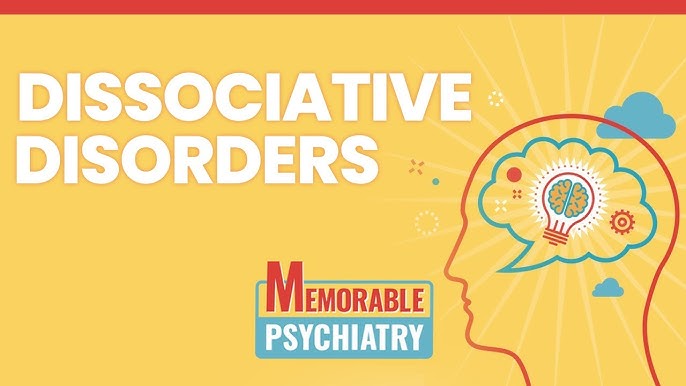Dissociative Disorders Symptoms: Dissociative disorders represent a complex group of mental health conditions that involve an involuntary escape from reality characterized by a disconnection between thoughts, identity, consciousness, and memory.
People suffering from these disorders may experience disruptions in their sense of self, struggle with memory loss, have multiple identities, or feel detached from their own thoughts and emotions.
This article delves into the symptoms and causes of dissociative disorders, providing a comprehensive understanding of these challenging conditions.
What are Dissociative Disorders?
Dissociative disorders are a group of mental health conditions characterized by an involuntary escape from reality, involving disruptions and disconnections in thought, identity, consciousness, and memory. Individuals with these disorders often experience a profound sense of detachment from themselves or their surroundings, which can significantly impact their daily functioning and quality of life. Dissociative disorders stem from complex interactions of genetic, environmental, and psychological factors, often triggered by trauma or stress.
Types of Dissociative Disorders
Dissociative disorders are categorized into several types, each with its unique symptoms and challenges:
1. Dissociative Amnesia: The main feature of this disorder is the inability to recall important personal information, usually of a traumatic or stressful nature, that cannot be explained by ordinary forgetfulness. Dissociative amnesia may be selective, related to a specific event or period, or more generalized, affecting a larger span of the person’s life.
2. Dissociative Identity Disorder (DID): Formerly known as multiple personality disorder, DID is characterized by the presence of two or more distinct personality states or identities within a single individual, each with its own pattern of perceiving and interacting with the environment. Transitions between these identities can be sudden and are often triggered by stress.
3. Depersonalization/Derealization Disorder: This disorder involves a persistent or recurrent feeling of being detached from one’s body or thoughts (depersonalization) or a sense of unreality or detachment from one’s surroundings (derealization). Individuals may feel like they are observing their life from outside their body or that the world around them is unreal.
4. Other Specified Dissociative Disorder (OSDD): This category is for dissociative disorders that do not fully meet the criteria for the other specified disorders but still present significant dissociative symptoms. It allows clinicians to specify the reason the presentation does not meet the criteria for other categories.
However, understanding dissociative disorders is crucial for early detection and effective treatment. Therapy often involves psychotherapy, medication, and support for affected individuals, aiming to integrate the dissociated parts of identity and improve their ability to function in daily life.
Common Symptoms of Dissociative Disorders
Understanding the common symptoms and how they manifest across different types of dissociative disorders is crucial for recognition and seeking appropriate treatment.
Detailed Description of Symptoms by Type
Dissociative Amnesia: Symptoms and How They Manifest
Dissociative Amnesia is characterized by an inability to recall important personal information, usually of a traumatic or stressful nature, that cannot be explained by ordinary forgetfulness. The amnesia may be specific to certain events, selective, or generalized, encompassing the individual’s entire life. People with dissociative amnesia might also experience dissociative fugue, a temporary, unexpected journey away from one’s home or workplace with an inability to recall one’s past.
Dissociative Identity Disorder: Symptoms and Identifying Signs
Formerly known as multiple personality disorder, Dissociative Identity Disorder (DID) involves the presence of two or more distinct identity or personality states that recurrently take control of the individual’s behavior. Each identity may have its own name, personal history, and characteristics, including differences in voice, gender identity, mannerisms, and preferences. Symptoms include gaps in memory about everyday events, personal information, and trauma. The transitions between identities can be triggered by stress or may happen spontaneously.
Depersonalization/Derealization Disorder: Symptoms and Experiences
This disorder is characterized by persistent or recurrent feelings of detachment from one’s own body or thoughts (depersonalization) and/or a sense of unreality or detachment from the environment (derealization). Individuals may feel like they are observing themselves from outside their body or like the world around them is unreal. Despite the detachment, people with depersonalization/derealization disorder remain in touch with reality.
Personal Experiences and Examples (Hypothetical Scenarios)
- Case of Dissociative Amnesia: John, a 35-year-old man, finds himself in a city park with no memory of how he arrived there. He is unable to remember anything from the past two days. After seeking help, he discovers he has been experiencing dissociative amnesia, likely triggered by recent stress at work.
- Dissociative Identity Disorder Scenario: Maria, a 28-year-old woman, has periods where she finds notes written in a handwriting that is not hers or discovers clothes in her closet that she does not remember buying. Her friends tell her about conversations they’ve had with her that she cannot recall. After a psychological evaluation, she is diagnosed with DID, revealing she has three distinct identities.
- Depersonalization/Derealization Experience: Alex, a 22-year-old college student, frequently feels like he is watching himself from outside his body, especially during stressful exams or social situations. He describes the world around him as feeling “dream-like” or “foggy.” This persistent sensation leads to a diagnosis of depersonalization/derealization disorder.
However, understanding these symptoms and their variations across different dissociative disorders can aid in early identification and the pursuit of treatment. If you or someone you know is experiencing these symptoms, seeking professional help from a mental health expert is a critical step toward recovery.
Causes and Risk Factors of Dissociative Disorders
Dissociative disorders are complex mental health conditions that disrupt a person’s thinking, memory, consciousness, and identity. Understanding the causes and risk factors behind these disorders is crucial for both healthcare professionals and those affected. This article explores the primary causes and various risk factors contributing to the development of dissociative disorders.
Psychological Trauma as a Primary Cause
At the heart of most dissociative disorders is psychological trauma, especially when experienced during the early stages of life. Traumatic events such as severe accidents, natural disasters, war, or personal violence can overwhelm an individual’s capacity to cope, leading to a dissociative response. This response is a defense mechanism, allowing the person to mentally escape from the pain and fear associated with the trauma. In essence, dissociation helps to compartmentalize the traumatic memories, separating them from the conscious mind.
Other Risk Factors Contributing to Dissociative Disorders
Childhood Abuse and Neglect
Extensive research highlights a strong correlation between childhood abuse (both physical and sexual) and neglect with the development of dissociative disorders. Early exposure to these traumatic experiences can significantly alter a child’s developing brain, affecting their ability to integrate thoughts, memories, and emotions effectively. Such experiences can set the foundation for dissociative symptoms to emerge, particularly if the child lacks a supportive environment to process their trauma.
Environmental Factors
The environment in which an individual grows up plays a significant role in the development of dissociative disorders. Factors such as living in a war-torn region, experiencing community violence, or growing up in a household with high levels of instability and dysfunction can increase the risk. These external pressures can exacerbate the effects of direct trauma or contribute to the development of dissociative symptoms on their own.
Genetic Predisposition and Brain Function
While the exact role of genetics in dissociative disorders is still under investigation, there is evidence to suggest that genetic factors, coupled with environmental influences, can predispose an individual to these conditions. Additionally, abnormalities in brain function, particularly in areas responsible for memory, emotion regulation, and consciousness, have been observed in individuals with dissociative disorders. These abnormalities may result from traumatic experiences altering brain development or could be inherent, increasing the susceptibility to dissociation in response to stress.
Recognizing these causes and risk factors is essential for early detection, effective treatment, and providing support to those affected. By understanding the roots of dissociation, we can foster a more compassionate and effective approach to mental health care, aiming for recovery and resilience in the face of adversity.
Diagnosing Dissociative Disorders
People suffering from these disorders might experience disruptions in their sense of self, memory lapses, and a perception of the world as unreal. Understanding the complexities involved in diagnosing dissociative disorders is crucial for both healthcare professionals and patients.
Challenges in Diagnosing
The diagnosis of dissociative disorders presents several challenges. Firstly, the symptoms can be highly variable, overlapping with those of other mental health conditions such as anxiety, depression, and post-traumatic stress disorder (PTSD), which can lead to misdiagnosis. Additionally, individuals with dissociative disorders may not always seek help due to stigma, lack of awareness, or the nature of their symptoms, which might not be perceived as indicative of a deeper issue. The subjective experience of dissociation and its variability in expression also makes it difficult for clinicians to recognize and diagnose these conditions without comprehensive assessment.
Common Diagnostic Criteria and Procedures
The Diagnostic and Statistical Manual of Mental Disorders (DSM-5), published by the American Psychiatric Association, provides criteria for diagnosing dissociative disorders. Common diagnostic procedures include:
- Clinical Interviews: Detailed discussions about the patient’s history, symptoms, and experiences are essential. These interviews help clinicians understand the extent of dissociation and its impact on the individual’s life.
- Diagnostic Scales and Questionnaires: Tools such as the Dissociative Experiences Scale (DES) or the Structured Clinical Interview for DSM-5 Dissociative Disorders (SCID-D) are used to assess dissociative symptoms in a standardized manner.
- Psychological Testing: Additional tests might be conducted to rule out other conditions, evaluate cognitive function, and understand the patient’s mental health status comprehensively.
- Physical Examinations: Though dissociative disorders are psychological, physical exams and tests can help exclude medical conditions that might mimic or contribute to dissociative symptoms.
Role of Healthcare Professionals in Diagnosis
Healthcare professionals play a pivotal role in the diagnosis of dissociative disorders. This includes not only psychiatrists and psychologists but also primary care providers who may be the first to recognize the signs of dissociation in patients. Their responsibilities include:
- Early Identification: Recognizing the symptoms early on can lead to a quicker diagnosis, which is crucial for effective treatment.
- Comprehensive Evaluation: Conducting thorough evaluations using interviews, questionnaires, and tests to accurately diagnose dissociative disorders.
- Referral to Specialists: In cases where specialized treatment is needed, healthcare professionals should refer patients to mental health specialists experienced in treating dissociative disorders.
- Patient Education: Educating patients about their condition, treatment options, and coping strategies is essential for effective management and recovery.
Healthcare professionals must be diligent, compassionate, and informed to navigate these challenges effectively. Through comprehensive evaluation and a collaborative approach to care, individuals suffering from dissociative disorders can be accurately diagnosed and supported through their recovery journey, leading to improved outcomes and quality of life.
Treatment Options for Dissociative Disorders
Understanding Treatment Options for Dissociative Disorders
Dissociative disorders represent a complex group of mental health conditions that disrupt an individual’s memory, identity, emotion, perception, and behavior. These disruptions can significantly impair the individual’s ability to function in daily life. Fortunately, several treatment options are available that offer hope and help to those affected. This guide explores the primary treatment strategies, including psychotherapy, medications, and emerging therapies, to provide a comprehensive overview of how dissociative disorders can be managed effectively.
Psychotherapy: The Cornerstone of Treatment
Psychotherapy, also known as talk therapy, stands as the central pillar in treating dissociative disorders. It involves one-on-one sessions between the patient and a trained therapist, focusing on understanding the causes of the disorder and developing strategies to cope with its symptoms. The goals of psychotherapy are multifaceted, aiming to integrate the different parts of identity, improve relationships, and enhance the patient’s ability to function. Several psychotherapeutic approaches are particularly beneficial, including:
- Cognitive Behavioral Therapy (CBT): This approach helps patients identify and challenge negative thought patterns and behaviors, promoting healthier ways of thinking and behaving.
- Dialectical Behavior Therapy (DBT): Originally developed for borderline personality disorder, DBT has proven effective for those with dissociative disorders, focusing on building coping skills to manage stress, emotions, and improve relationships.
- Eye Movement Desensitization and Reprocessing (EMDR): EMDR is a specialized therapy designed to help patients process and integrate traumatic memories, which are often at the heart of dissociative disorders.
Medications and Their Role in Treatment
While there are no medications specifically approved for the treatment of dissociative disorders, certain medications can be beneficial in managing symptoms or comorbid conditions. Antidepressants, anti-anxiety medications, and antipsychotics might be prescribed to alleviate symptoms such as depression, anxiety, or other manifestations that often accompany dissociative disorders. It’s crucial for medication to be closely monitored by a healthcare professional and used in conjunction with psychotherapy for the best outcomes.
Emerging Therapies and Interventions
As research into dissociative disorders continues, new and innovative therapies are emerging, offering additional avenues for treatment. These include:
- Mindfulness and Meditation: Techniques focusing on mindfulness and meditation can help individuals with dissociative disorders become more aware of the present moment and reduce episodes of dissociation.
- Art and Music Therapy: These creative therapies offer alternative ways for individuals to express themselves and process their experiences, facilitating healing in a non-verbal manner.
- Neurofeedback: This therapy uses real-time displays of brain activity to teach self-regulation of brain function, and it is gaining attention as a potential tool for managing symptoms of dissociative disorders.
Each individual’s treatment plan should be tailored to their specific needs, taking into account the complexity of their symptoms and their personal recovery goals. With the right support and treatment, individuals with dissociative disorders can achieve significant improvements in their quality of life.
Living with Dissociative Disorders
Living with a dissociative disorder can present unique challenges in daily life. However, with the right coping strategies and a strong support system, individuals can lead fulfilling lives. This section explores effective ways to manage symptoms, the critical role of support from family, friends, and support groups, and shares success stories that inspire and offer hope.
Managing Symptoms in Daily Life
For those living with dissociative disorders, managing symptoms on a day-to-day basis is crucial for maintaining a sense of normalcy and achieving personal goals. Key strategies include:
- Routine Maintenance: Establishing a daily routine helps in providing structure, which can be comforting for individuals facing dissociative episodes. A consistent schedule for meals, sleep, and activities can enhance feelings of stability.
- Mindfulness Practices: Engaging in mindfulness and grounding techniques can be beneficial. Practices such as meditation, deep breathing exercises, and mindfulness-based stress reduction (MBSR) can help individuals remain present and reduce the frequency of dissociative episodes.
- Professional Therapy: Seeking professional help from psychologists or psychiatrists specializing in dissociative disorders is essential. Therapies like cognitive-behavioral therapy (CBT) and dialectical behavior therapy (DBT) can be effective in managing symptoms.
Importance of Support Systems (Family, Friends, Support Groups)
The role of a strong support system cannot be overstated when living with a dissociative disorder. Support from family and friends provides a foundation of understanding and acceptance. These personal connections:
- Offer emotional support during challenging times.
- Help in recognizing early signs of dissociative episodes, facilitating timely intervention.
- Encourage engagement in treatment and adherence to therapy.
Furthermore, joining support groups, either in person or online, can provide a sense of community and belonging. These groups offer:
- A platform to share experiences and coping strategies with others who understand what you’re going through.
- Access to resources and information about managing dissociative disorders.
- Emotional support and encouragement from peers.
Success Stories and Coping Strategies
Hearing about others who have successfully managed their dissociative disorders can be incredibly inspiring. Success stories often highlight:
- Personal journeys of understanding and accepting their condition.
- Effective coping strategies that have helped individuals reduce symptoms and improve their quality of life.
- The pivotal role of therapy, support systems, and personal resilience in overcoming challenges.
These narratives not only provide hope but also practical insights into living well with dissociative disorders. They underscore the importance of persistence, support, and self-care in navigating the complexities of these conditions.
By adopting effective coping strategies, leaning on the support of loved ones, and drawing inspiration from success stories, individuals can navigate their symptoms and lead rewarding lives. Remember, seeking professional help and connecting with others facing similar challenges can make a significant difference in your journey toward wellness.
Prevention and Early Intervention of Dissociative disorders
Preventing and managing dissociative disorders early can significantly reduce the severity of symptoms and improve quality of life. These strategies focus on identifying potential symptoms early on, providing immediate support, and accessing resources to prevent the progression of these disorders. Here’s a comprehensive guide on prevention and early intervention of dissociative disorders, designed with SEO and readability in mind.
Strategies to Prevent the Development of Severe Symptoms
Recognize Early Signs
Early recognition of the symptoms is crucial. Symptoms might include memory lapses, a sense of being detached from oneself (depersonalization), and a perception of the world as unreal (derealization). Identifying these signs early can lead to quicker intervention, potentially preventing the development of more severe symptoms.
Stress Management
Since stress can exacerbate or trigger dissociative symptoms, learning effective stress management techniques is vital. Practices such as mindfulness, meditation, and yoga can help manage stress levels. Regular physical activity and a healthy diet also play a significant role in overall mental health.
Build Support Systems
Having a strong support system can provide emotional stability and reduce feelings of isolation, which are often associated with dissociative disorders. This can include friends, family, or support groups where experiences can be shared in a safe and understanding environment.
Importance of Early Detection and Intervention
Early detection and intervention are key in managing dissociative disorders effectively. The sooner these disorders are identified, the better the outcome for the individual. Early intervention can:
- Prevent the progression to more severe forms of the disorder.
- Reduce the need for more intensive and longer-term treatment.
- Help individuals learn coping strategies to manage symptoms effectively.
Resources for Help and Support
Numerous resources are available for those seeking help with dissociative disorders:
Mental Health Professionals
Psychologists, psychiatrists, and counselors specializing in dissociative disorders can provide diagnosis and treatment. Treatments may include therapy, such as cognitive-behavioral therapy (CBT) or dialectical behavior therapy (DBT), which have been found effective in managing symptoms.
Online Resources and Support Groups
Websites and online forums can offer valuable information and support. Organizations like the International Society for the Study of Trauma and Dissociation (ISSTD) provide resources for both individuals and professionals.
Crisis Hotlines
In moments of crisis, hotlines can provide immediate support and guidance. It’s important to have these numbers accessible if you or someone you know is struggling with dissociative symptoms.
Early detection allows for timely intervention, which can significantly lessen the severity of symptoms. With a variety of resources available, help and support are within reach for those affected by dissociative disorders. By taking proactive steps, individuals can navigate their symptoms more effectively and lead fulfilling lives.
FAQ Section on Dissociative Disorders
What Are Dissociative Disorders?
Dissociative disorders are a group of mental health conditions that involve experiencing a disconnection and lack of continuity between thoughts, memories, surroundings, actions, and identity. People with dissociative disorders escape reality in ways that are involuntary and unhealthy, affecting the normal function of life in various ways.
What Causes Dissociative Disorders?
The exact cause of dissociative disorders is not fully understood, but they often result from a combination of factors, including severe stress, trauma, and a history of abuse during early childhood. Dissociative disorders are more common in people who have experienced physical and emotional abuse, neglect, or lived through natural disasters, wars, or other stressful events.
What Are the Types of Dissociative Disorders?
The main types of dissociative disorders include:
- Dissociative Amnesia: Involves difficulty remembering important information about oneself.
- Dissociative Identity Disorder (DID): Formerly known as multiple personality disorder, DID is characterized by the presence of two or more distinct personality states.
- Depersonalization/Derealization Disorder: Involves feeling detached from one’s self (depersonalization) or feeling disconnected from the world around you (derealization).
How Are Dissociative Disorders Diagnosed?
Diagnosing dissociative disorders typically involves a thorough evaluation by a mental health professional. This evaluation may include a physical exam to rule out other causes, a psychiatric assessment, and discussing symptoms and personal history. Diagnosis is based on criteria in the Diagnostic and Statistical Manual of Mental Disorders (DSM-5) published by the American Psychiatric Association.
Can Dissociative Disorders Be Treated?
Yes, dissociative disorders can be treated, often with a combination of psychotherapy and medication. Treatment plans are tailored to the individual and may include:
- Psychotherapy: Also known as talk therapy, psychotherapy is the primary treatment for dissociative disorders. Techniques such as cognitive-behavioral therapy (CBT) and dialectical behavior therapy (DBT) can be effective.
- Medication: While there are no medications specifically approved for dissociative disorders, doctors may prescribe antidepressants, anti-anxiety medications, or antipsychotics to help control symptoms.
- Support Groups: Joining a support group can provide valuable understanding and encouragement.
Is Recovery Possible?
Yes, recovery from dissociative disorders is possible, although the path can vary significantly from person to person. With the right treatment and support, many people can manage their symptoms effectively and lead fulfilling lives.
Can Dissociative Disorders Be Prevented?
While there’s no sure way to prevent dissociative disorders, early intervention in cases of trauma and abuse can reduce the risk. Providing a supportive environment for those experiencing stress or trauma, as well as seeking professional help early, can make a significant difference.
Conclusion:
As we conclude, it’s crucial to hold onto the message that living with or supporting someone with a dissociative disorder is a journey marked by challenges, learning, and growth. It’s a path that demands patience, compassion, and resilience from everyone involved. Remember, the aim is not to ‘cure’ the person of their experiences but to support them in understanding and managing their symptoms so they can lead a fulfilling life.
Dissociative disorders, with their complex nature, remind us of the brain’s incredible ability to protect itself and, by extension, the individual. They highlight the importance of mental health awareness and the need for accessible, effective mental health care. Let this be a call to action for society to continue breaking down the stigmas surrounding mental health issues and to foster environments where individuals feel safe to seek the help they need.
In closing, whether you are living with a dissociative disorder or supporting someone who is, remember that you are not alone. There is strength in seeking help, and there is hope in the journey ahead. Together, through understanding, support, and compassion, navigating the path of dissociative disorders can lead to a place of empowerment and peace.



